
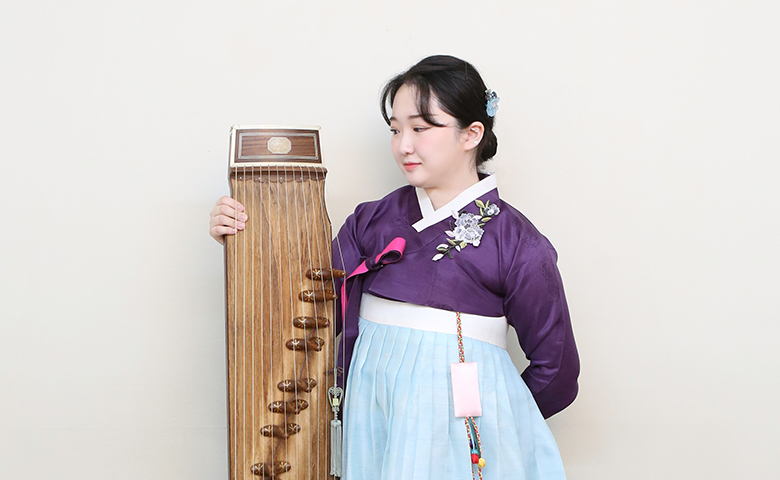
“For me, KSI Cultural Internship was
a self-realization”
Park Do-hyeon,
outstanding KSI Culture Intern in 2023
“KSI Culture Intern” is a program that selects university (or graduate school) students majoring in culture and arts or with equivalent experience and dispatches them to KSI locations. KSI Culture Interns go to local KSIs to provide Korean culture classes. Today, we met with Park Do-hyeon, who has returned from KSI Bishkek, Kyrgyzstan, after doing activities as KSI Culture Intern.
Good morning. Please tell us about yourself.
Hello! I'm Park Do-hyeon, a senior year of majoring in Korean Traditional Arts Theory at the Korea National University of Arts School of Korean Traditional Arts. From August to December 2023, I worked as a KSI Culture Intern at KSI in Bishkek, the capital of Kyrgyzstan. I worked on promoting Korean traditional arts, particularly danso (Korean bamboo flute) classes.
How did you find out about the KSI Culture Intern and apply?
I heard that the Korea National University of Arts sends KSI Culture Interns every year. So, I've been paying close attention to information about KSI Culture Internship since my freshman year. In 2023, when the timing was right, I applied for the KSI Culture Intern.
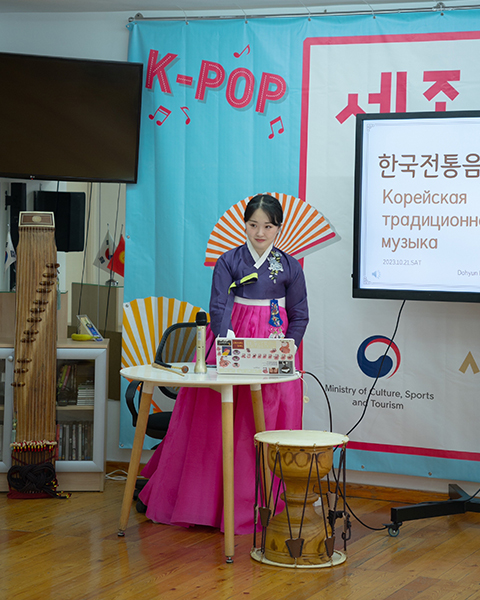
How did you feel when you were assigned to Bishkek, Kyrgyzstan? What were the difficulties in preparing for the dispatch?
To be honest, Kyrgyzstan was a somewhat unfamiliar country to me. However, I decided to go after hearing stories from people who had been dispatched to Kyrgyzstan before and getting strong recommendations from acquaintances working in Kyrgyzstan as volunteers for the Korea International Cooperation Agency. Above all, I thought this was a rare opportunity during my university years. Thanks to Aidiana, the operating staff who took care of me, I was able to reduce my workload.
What was the interest and perception of the Korean language and culture in Bishkek, compared to what you expected?
During the preparation, the part I worried about the most was the 'level of participation’ from the learners of KSI Bishkek. I thought that they would have very little interest in Korea just as I didn't know much about Kyrgyzstan. However, the people of Bishkek showed great interest in Korea that I never had to worry about their participation during the four months I served as a KSI Culture Intern. They enjoyed Korean dramas, movies, and K-pop and enjoyed Korean food. When I spoke Korean on the streets of Bishkek, locals would greet me in Korean, saying, "Are you Korean? Ahn-nyeong-ha-se-yo (Hello in Korean).”
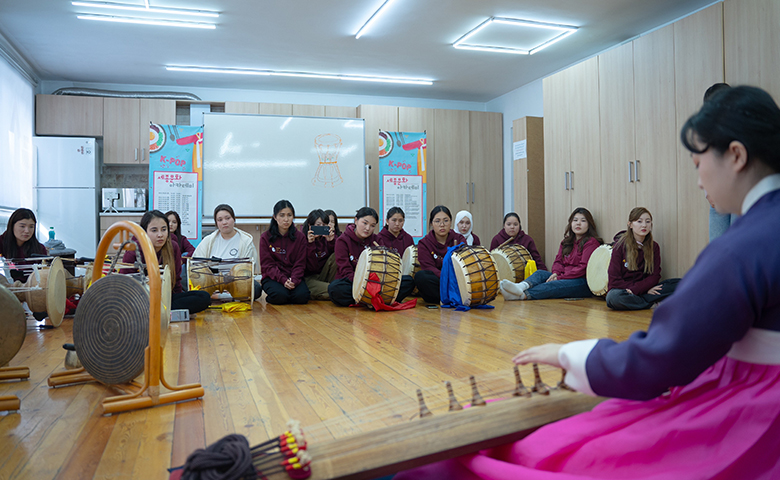 Special lecture on gayageum (Korean harp) given by Park Do-hyeon
Special lecture on gayageum (Korean harp) given by Park Do-hyeon
You conducted danso classes for four months and performed at the completion ceremony. I'd like to know about what classes were like, the students' reactions and the results of the classes.
I have been playing gayageum (Korean harp) when I was a child, but it was difficult to bring many gayageums to Kyrgyzstan, so I taught 'danso,' another traditional Korean musical instrument. It was a total of two classes, one in the morning and one in the afternoon on Tuesdays and Thursdays, each lasting one hour, with 10-12 students in each class. Danso is an instrument that can be easily played once you learn the basic principles and techniques, so after four sessions of basic training, we were able to proceed with various pieces of music, including Korean traditional music and K-pop.
Through teaching danso, my goal was to increase understanding of Korean traditional music and get close to the learners, so I designed various special lectures. I taught the characteristics of Korean traditional music such as Jangdan (rhythm), Nonghyeon (vibrato), and Sigimsae (performance practice). When teaching Korean songs, I explained the meanings of the Korean lyrics to the learners.
Adjusting the pace of the class to match the students' learning speed was a bit difficult. There were days when they followed better than I expected, and there were days when they didn't, so the plan I prepared before going was revised each time. But I was able to approach each class with a new mindset every time I prepared for the lesson.
For the completion ceremony, we selected five pieces through voting and performed a medley of danso and gayageum ensemble. Achieving our goal after four months of hard work gave both the learners and me great strength. It is a secret that we hugged each other and cried on the last day of class and the day of the performance (laughs).
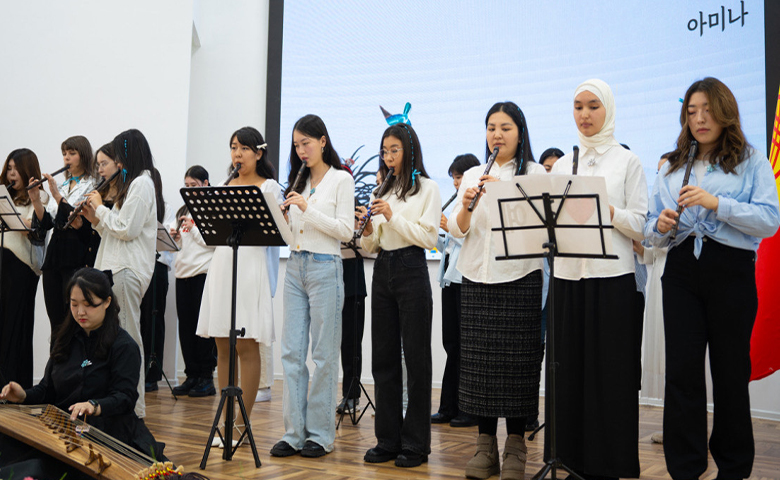
You also gave a special lecture on 'Ganggangsullae' (Korean circle dance) for Chuseok and a special lecture on Korean traditional music at Sejong Culture Academy. Even if it is your major, it must have been very difficult to introduce traditional Korean culture to foreign learners. How did you feel about disseminating Korean traditional culture.
I started learning gayageum at the age of 10 and studied traditional music for about 12 years. I have always been thinking about the 'position of Korean traditional music.' Korean dramas, movies, food, and K-beauty have already advanced to the world, but I wondered, 'Can Korean traditional music also do that?' Korean music uses a completely different musical system from Western music, so I think understanding of this system is a major challenge. However, during my time as a KSI Culture Intern, I realized that “our differences are our strengths.” The unique characteristics of Korea are what attracted people. I think the unfamiliarity of Korean traditional culture was actually a charming point for them.
Special lecture on Ganggangsullae for Chuseok
Did you have any difficulty in communication while working as a KSI Culture Intern?
There were a lot of difficulties. Since Bishkek primarily uses Russian and Kyrgyz and English is hardly understood, I had a hard time. However, as time went by, I could gradually understand, and I was able to make simple daily conversations. During classes, there wasn't much difficulty as KSI provided interpretation. It was especially helpful that learners who had been studying Korean for a long time provided translation in Danso classes. I really want to give thanks to Kasiet and Anna!
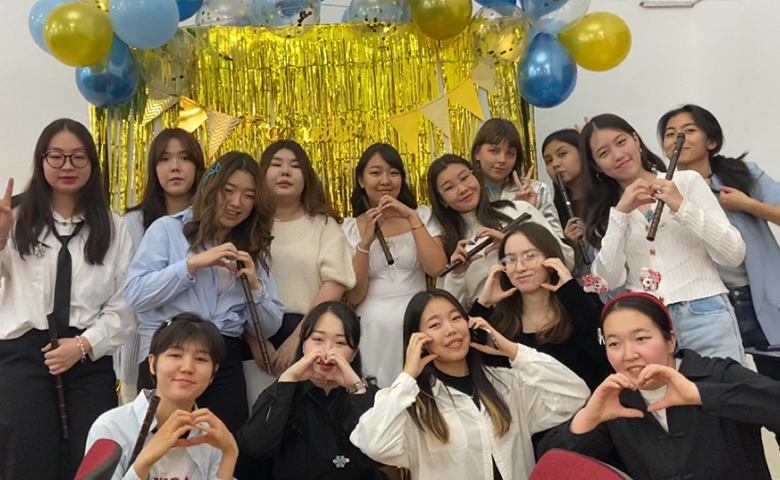
How do you think your experience as a KSI Culture Intern has helped you in your future? Do you feel that you have grown as a person?
I believe that being a KSI Culture Intern has been a great opportunity because it allowed me to handle everything from planning to execution and completion. Through experiences in planning, teaching, and operating, I learned about the structure and operation of educational institutions. As I was interested in arts planning and management, it was a truly valuable opportunity for me.
I dream of “giving the gift” of traditional Korean music, which I love so much, to the world. In that sense, this KSI Culture Internship was a realization of that dream, and I had a truly happy time. I gave a lot and earned a lot. It was challenging but rewarding. I learned how to be brave despite my fears. I will never forget these four months.
I am delighted that KSI Bishkek was selected as the best KSI in 2023, and I am honored to have been chosen as an outstanding culture intern. I would like to express my deep gratitude to Director Son Dong-won, the operating staff, and instructors for always taking care of me.